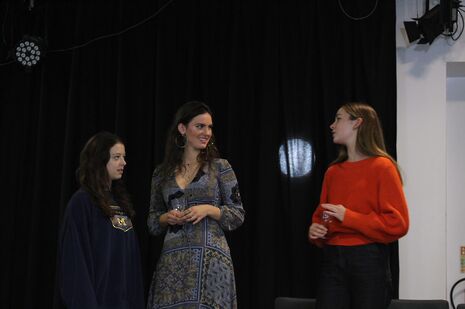Parisienne is a clunky, missed opportunity
Cadence Ware’s new play has potential but is lacking energy and nuance
A life depends on decisions: big ones and small ones; some that we would change if we could and some whose effect we don’t even realise now. Cadence Ware’s new play Parisienne sets out to explore these pivotal moments, and what would happen if things had been different. Her play is framed by a series of photographs on a dressing-room table, and a narrator figure looking back at her past through these photographed scenes.

It’s a promising premise. It could make a subtle piece of theatre about alternative endings and learning to live with just one. On occasion the aim is off – a cliché or a one-liner at moments when perhaps a more nuanced, gentle exploration would have been closer to the mark.
There are some very pleasing performances. Daniel Quigley, Saul Barrett and Oscar Ings as Chris, Ollie and Jack respectively act with a light touch. Quigley is hilariously direct and his timing is effortlessly spot-on, while Barrett captures confidently the all-too-familiar youngest brother living at home long after the others. Ings’s lingering looks during the party scene are carefully timed and wistfully honest.
Both Ashleys also deserve praise. Katie Chambers as ‘Ashley II’ injects energy into the production and her movements seem natural and never contrived (her Shakespeare is pretty good, too). Zoe Belcher as Ashley plays a difficult narrator figure with impressive vocal control, manipulating the pace and volume of her lines, speeding up in frenzy and slowing down again to enunciate each consonant. Perhaps Belcher would have been even better used by being allowed to move away from the dressing table to make greater use of the stage, and interact with the photographed scenes. A static narrator can have some challenge keeping the audience’s attention – animating the role can help.
“On occasion the aim is off – a cliché or a one-liner at moments when perhaps a more nuanced, gentle exploration would have been closer to the mark”
Perhaps the directors could have been more adventurous in all aspects of the piece. The play may have benefited from a stronger interpretation of character – when the director is a writer with such a clear view of her characters it can perhaps stifle the actor’s interpretation, or at least trammel it. That is where the importance of assistant directors Emily Moss and Lakshana Gunathilagan comes in. When working with a writer-director, an assistant director can be critical to the transformation from page to staging.
The themes and set-up of this play have a lot of potential. This could have been a metatheatrical piece, disorienting its audience and making them pause to think about the way their lives are shaped by tiny moments that cannot be captured by a static photograph. There were some wonderful individual performances, but there were gaps between lines and moments of disjointed movement that could have been smoothed.
There is potential in Parisienne. It perhaps needs an injection of new energy, amplification of its more stylised theatrical moments, and attention to its occasionally too-obvious moments. With a bolder interpretation, more nuance and more confident direction, I think it could be transformed into an intriguing piece.
 Features / Are you more yourself at Cambridge or away from it? 27 January 2026
Features / Are you more yourself at Cambridge or away from it? 27 January 2026 News / Vigil held for tenth anniversary of PhD student’s death28 January 2026
News / Vigil held for tenth anniversary of PhD student’s death28 January 2026 Interviews / Lord Leggatt on becoming a Supreme Court Justice21 January 2026
Interviews / Lord Leggatt on becoming a Supreme Court Justice21 January 2026 News / Reform candidate retracts claim of being Cambridge alum 26 January 2026
News / Reform candidate retracts claim of being Cambridge alum 26 January 2026 Comment / How Cambridge Made Me Lose My Faith26 January 2026
Comment / How Cambridge Made Me Lose My Faith26 January 2026










